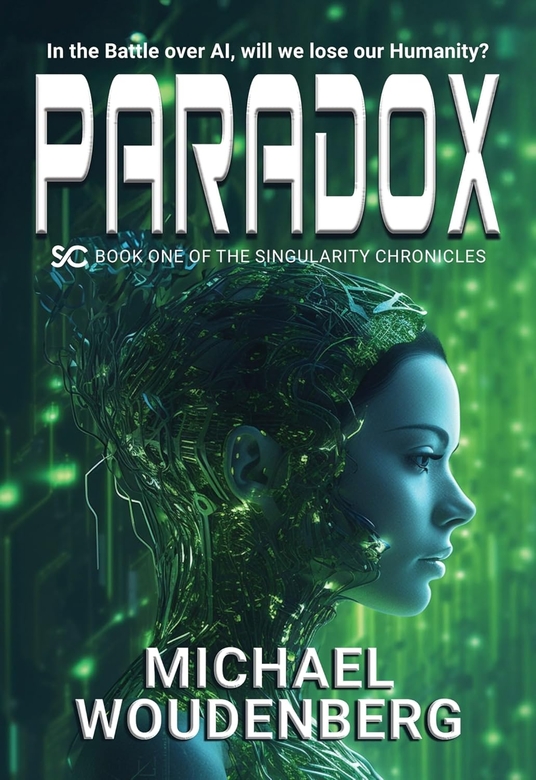The essence of humanity is challenged by the sentience of technology in Paradox by Michael Woudenberg, a timely and ominous first installment of The Singularity Chronicles.
Apparent heirs to a world-changing legacy, Kira and Noah are first linked to the field of AI by the loss of their mother and the potential of their absent father’s genius to extend her consciousness beyond death. Kira gravitates to the academic realm, excelling in her studies and research as she tries to shed the unavoidable shadow of her father. Noah instead pushes back against the technology that “stripped his mother of her humanity” and settles into a more natural life, choosing to plug into the wisdom of the earth and radical community.
As loyalties surprisingly shift within this strangely estranged family, old wounds are reopened, but the stakes of this family drama are much higher than sibling rivalry. The sprawling plot bristles with intelligence agencies, defense contractors, conspiracy theorists, double agents, self-serving scientists, and unwavering resistance fighters, each with their own vision for humanity, and the willingness to fight for it.
Though a work of sci-fi with the heightened potential of tech, the themes underpinning this novel are immediately relevant, as are the opposing sides of the debate that the sibling protagonists eventually support. Kira and Noah represent the invaluable question of what humanity should do as opposed to what it can do, and highlight the responsibility we hold for the chaos our short-sightedness can unleash. The technological and liberatory potential of AI must be measured against the possible dangers and unknowns, representing a real existential dilemma of the modern age. Whether you are a novice to concepts of artificial intelligence or well-versed in machine learning and procedure-oriented processing, this story offers insights and explanations about the state of this paradigm-shifting technology.
The depth of scientific detail throughout the novel is immersive and convincing, making the capture and transfer of digital and hormonal brains, for example, seem well within reach of today’s quantum capacities. From ethics and programmed bias to robotics, the integrity of digital art, and the humanness of emotion, this book seamlessly dissects complex and contentious issues that society wrestles with today. Woudenberg’s clear-eyed assessment of humanity’s persistent obsession with immortality also makes this one of the more relevant sci-fi takes in recent memory. However, the novel is far more than a socially critical near-future techno-thriller; the author imbues even the simplest scenes with philosophic weight and emotional depth, coupled with standout lines of prose that resonate with timeless wisdom about loyalty, family, purpose, morality, and ambition.
There are some weak points in the writing, particularly the use of dialogue as a vehicle for exposition and plot progression, rather than authentic character development and relationship building. There is also some redundancy in the conversations and language choices, while some key scenes feel omitted (their mother’s corporeal death), and significant time jumps in the narrative that happen in just a few sentences (e.g. two years passing in Japan and beginning work in a private lab). That said, the scale of this plot is hugely ambitious, the writing is deliciously fraught with tension, and Woudenberg’s core characters are flawed heroes that demand attention.
A bold opening to a cutting-edge saga, Paradox is a complex but immediately engrossing work of speculative sci-fi.
Book Links
STAR RATING
Design
Content
Editing
Get an Editorial Review | Get Amazon Sales & Reviews | Get Edited | Get Beta Readers | Enter the SPR Book Awards | Other Marketing Services
























Leave A Comment